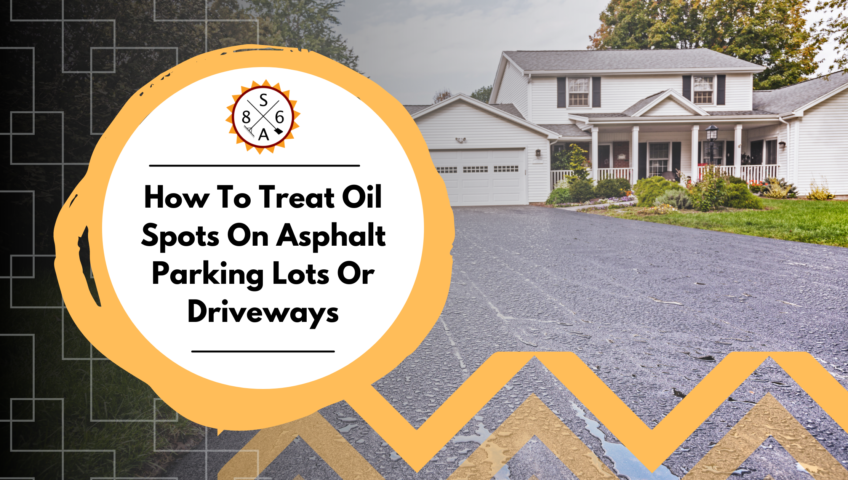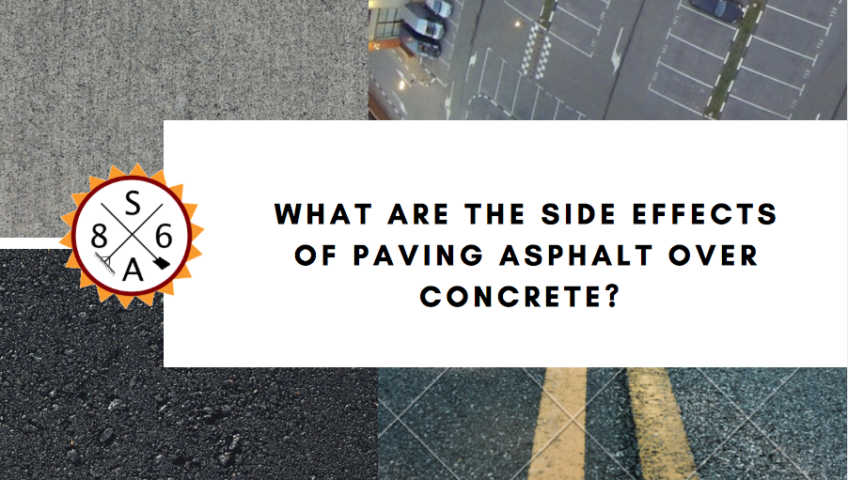
How To Treat Oil Spots On Asphalt Parking Lots Or Driveways
No one likes to see oil spots on the driveway or in a parking lot. They are not pleasant to see and challenging to clean. Oil spots on asphalt can do more than just look unattractive. They can cause extensive damage to the asphalt. However, there are some ways to treat it once there are oil spots on the asphalt.
Option #1 – Fresh Oil Spots
When there are new oil spots on your driveway or parking lot, these are the easiest ones to clean. A new oil spot on asphalt is a stain on the surface. The best way to clean this is to use detergent to scrub the oil spot. Once you have completely scrubbed it, you want to rinse it with water thoroughly. This will remove the oil and detergent. Once you have removed the oil spot, you want to add a seal coating layer to protect the asphalt.
If the oil spot is still wet, you can use kitty litter to soak up the oil. You can use an entire bag of kitty litter to cover the stain. Stomp on the kitty litter to help it absorb the oil. Leave the kitty litter on the stain overnight, then scoop up the kitty litter and dispose of the waste. If that does not work, you can use baking soda as that is great for absorbing oil. You can sprinkle the baking soda on the oil and scrub it with a stiff brush. After the baking soda has sat for 30 minutes, rinse it with a hose. You can also use a steam pressure washer to turn the oil into a liquid and whisk it away. This may be the most effective way to remove the oil.
Option #2 – Stains Seeped into Asphalt
When an oil stain sits on asphalt, it seeps into the asphalt. Once this happens, the asphalt material begins to fall apart. It requires more substantial treatment than detergent and water. Oil seeped into the asphalt dissolves the binder, and chunks will start to break off. Once this happens, the asphalt cracks and may make a slight depression in the asphalt. As long as pitting has not occurred in the asphalt, infrared hear can be used for asphalt repair. Once you have used infrared heat to repair the asphalt, you want to add a seal coating layer to protect the asphalt.
Option #3 – New Asphalt is Needed
The damage from the oil stains on the asphalt can be so extensive that they begin to soften the pavement, which means you need to start over again with new asphalt. This requires the impacted area to be cut out with a saw and a patch applied over the area. Once the patch is applied, you should add a seal coating layer to protect the asphalt. This is usually an inexpensive repair, but it is critical to avoid more significant concerns with potholes in the driveway or parking lot.
Option #4 – Prevent Asphalt Damage
The best way to protect your driveway or parking lot from damage is to use seal coating services. This process seals the asphalt so that items such as oil do not penetrate the surface and cause more damage.
No one likes to see oil spots on the driveway or in a parking lot. They are not pleasant to see and challenging to clean. Oil spots on asphalt can do more than just look unattractive. They can cause extensive damage to the asphalt. However, there are some ways to treat it once there are oil spots on the asphalt.
Option #1 – Fresh Oil Spots
When there are new oil spots on your driveway or parking lot, these are the easiest ones to clean. A new oil spot on asphalt is a stain on the surface. The best way to clean this is to use detergent to scrub the oil spot. Once you have completely scrubbed it, you want to rinse it with water thoroughly. This will remove the oil and detergent. Once you have removed the oil spot, you want to add a seal coating layer to protect the asphalt.
If the oil spot is still wet, you can use kitty litter to soak up the oil. You can use an entire bag of kitty litter to cover the stain. Stomp on the kitty litter to help it absorb the oil. Leave the kitty litter on the stain overnight, then scoop up the kitty litter and dispose of the waste. If that does not work, you can use baking soda as that is great for absorbing oil. You can sprinkle the baking soda on the oil and scrub it with a stiff brush. After the baking soda has sat for 30 minutes, rinse it with a hose. You can also use a steam pressure washer to turn the oil into a liquid and whisk it away. This may be the most effective way to remove the oil.
Option #2 – Stains Seeped into Asphalt
When an oil stain sits on asphalt, it seeps into the asphalt. Once this happens, the asphalt material begins to fall apart. It requires more substantial treatment than detergent and water. Oil seeped into the asphalt dissolves the binder, and chunks will start to break off. Once this happens, the asphalt cracks and may make a slight depression in the asphalt. As long as pitting has not occurred in the asphalt, infrared hear can be used for asphalt repair. Once you have used infrared heat to repair the asphalt, you want to add a seal coating layer to protect the asphalt.
Option #3 – New Asphalt is Needed
The damage from the oil stains on the asphalt can be so extensive that they begin to soften the pavement, which means you need to start over again with new asphalt. This requires the impacted area to be cut out with a saw and a patch applied over the area. Once the patch is applied, you should add a seal coating layer to protect the asphalt. This is usually an inexpensive repair, but it is critical to avoid more significant concerns with potholes in the driveway or parking lot.
Option #4 – Prevent Asphalt Damage
The best way to protect your driveway or parking lot from damage is to use seal coating services. This process seals the asphalt so that items such as oil do not penetrate the surface and cause more damage.



